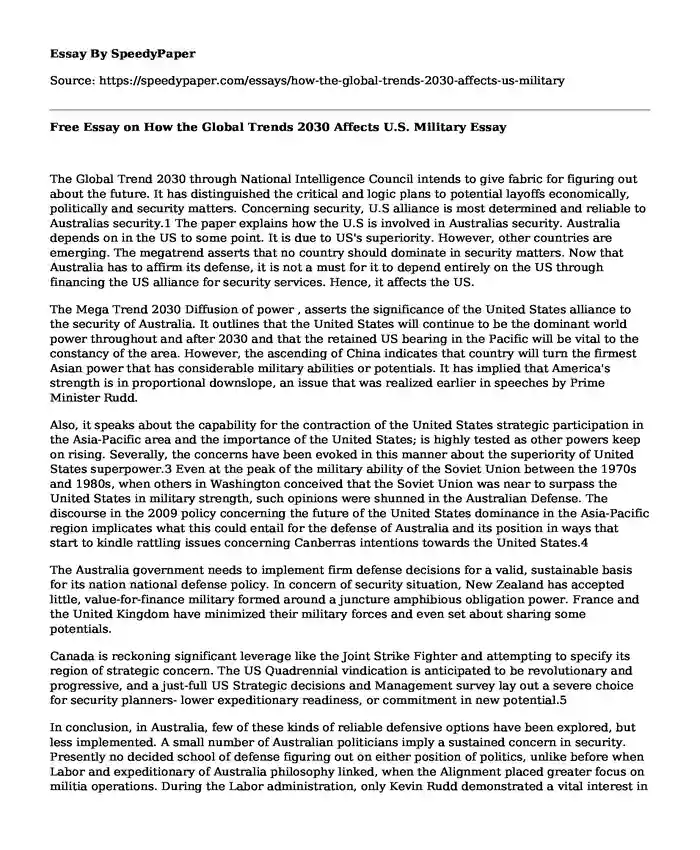
| Type of paper: | Essay |
| Categories: | United States Army |
| Pages: | 3 |
| Wordcount: | 661 words |
The Global Trend 2030 through National Intelligence Council intends to give fabric for figuring out about the future. It has distinguished the critical and logic plans to potential layoffs economically, politically and security matters. Concerning security, U.S alliance is most determined and reliable to Australias security.1 The paper explains how the U.S is involved in Australias security. Australia depends on in the US to some point. It is due to US's superiority. However, other countries are emerging. The megatrend asserts that no country should dominate in security matters. Now that Australia has to affirm its defense, it is not a must for it to depend entirely on the US through financing the US alliance for security services. Hence, it affects the US.
The Mega Trend 2030 Diffusion of power , asserts the significance of the United States alliance to the security of Australia. It outlines that the United States will continue to be the dominant world power throughout and after 2030 and that the retained US bearing in the Pacific will be vital to the constancy of the area. However, the ascending of China indicates that country will turn the firmest Asian power that has considerable military abilities or potentials. It has implied that America's strength is in proportional downslope, an issue that was realized earlier in speeches by Prime Minister Rudd.
Also, it speaks about the capability for the contraction of the United States strategic participation in the Asia-Pacific area and the importance of the United States; is highly tested as other powers keep on rising. Severally, the concerns have been evoked in this manner about the superiority of United States superpower.3 Even at the peak of the military ability of the Soviet Union between the 1970s and 1980s, when others in Washington conceived that the Soviet Union was near to surpass the United States in military strength, such opinions were shunned in the Australian Defense. The discourse in the 2009 policy concerning the future of the United States dominance in the Asia-Pacific region implicates what this could entail for the defense of Australia and its position in ways that start to kindle rattling issues concerning Canberras intentions towards the United States.4
The Australia government needs to implement firm defense decisions for a valid, sustainable basis for its nation national defense policy. In concern of security situation, New Zealand has accepted little, value-for-finance military formed around a juncture amphibious obligation power. France and the United Kingdom have minimized their military forces and even set about sharing some potentials.
Canada is reckoning significant leverage like the Joint Strike Fighter and attempting to specify its region of strategic concern. The US Quadrennial vindication is anticipated to be revolutionary and progressive, and a just-full US Strategic decisions and Management survey lay out a severe choice for security planners- lower expeditionary readiness, or commitment in new potential.5
In conclusion, in Australia, few of these kinds of reliable defensive options have been explored, but less implemented. A small number of Australian politicians imply a sustained concern in security. Presently no decided school of defense figuring out on either position of politics, unlike before when Labor and expeditionary of Australia philosophy linked, when the Alignment placed greater focus on militia operations. During the Labor administration, only Kevin Rudd demonstrated a vital interest in determining military strategy. In spite of the passing of a National Security plan and a Defence White Paper in 2013, both prime minister Julia Gillard and former defense minister Stephen Smith did not provide much in the manner of their opinions on the strategic role of the nations defense.
Bibliography
1Global Trends 2030. 2015.
2Rudman, Jack. Redesigning Defense: Planning the Transition to the Future U.S. Defense Industrial Base. [S.l.]: Diane Pub Co, 1991.
3Birtle, Andrew James. U.S. Army Counterinsurgency and Contingency Operations Doctrine, 1942-1976. Washington, DC: Center of Military History, United States Army, 2006.
4Ibid.
5Rudman, Jack. Redesigning Defense: Planning the Transition to the Future U.S. Defense Industrial Base. [S.l.]: Diane Pub Co, 1991.
Cite this page
Free Essay on How the Global Trends 2030 Affects U.S. Military. (2019, Sep 11). Retrieved from https://speedypaper.com/essays/how-the-global-trends-2030-affects-us-military
Request Removal
If you are the original author of this essay and no longer wish to have it published on the SpeedyPaper website, please click below to request its removal:
- Free Essay on Bitcoins and Money Laundering
- New Subsidiary for Pfizer Pharmaceutical - Free Essay
- Law Essay Sample: Brown V. Board Education
- Free Paper Sample: Virtual Team Writing Strategies That Reduce Emotional Hijacking
- Free Essay Sample on Ear Diseases
- Gilded Age and Why It Was a Violent Time - Free Essay Example
- Free Essay Example: Business Application Project
Popular categories




